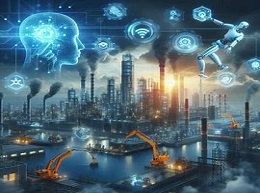The Rise of AI in Industrial Automation and Smart Factories

AI in Industrial Automation: Smart Factories
In the era of Industry 4.0, Artificial Intelligence (AI) is transforming industrial automation, ushering in the era of smart factories. With advanced AI technologies, manufacturers can optimize production processes, improve quality control, and unlock new levels of efficiency and innovation. In this article, we'll delve into the rise of AI in industrial automation, exploring its applications, benefits, and implications for the future of manufacturing.
Smart Factories: Smart factories leverage AI, Internet of Things (IoT), and data analytics to create interconnected and intelligent manufacturing environments. These facilities are equipped with sensors, actuators, and AI-powered systems that enable real-time monitoring, analysis, and control of production processes. By integrating AI into industrial automation, smart factories can adapt to changing demand, optimize resource utilization, and enhance overall operational efficiency.
AI-Powered Predictive Maintenance: AI algorithms analyze sensor data and machine telemetry to predict equipment failures and prevent unplanned downtime in smart factories. For example, predictive maintenance systems use machine learning models to detect anomalies, identify potential issues, and schedule maintenance tasks before equipment failure occurs. By proactively addressing maintenance needs, manufacturers can minimize disruptions, reduce maintenance costs, and extend the lifespan of machinery and equipment.
Optimized Production Planning and Scheduling: AI-driven production planning and scheduling algorithms optimize production workflows, minimize idle time, and maximize resource utilization in smart factories. These algorithms consider factors such as production capacity, inventory levels, and demand forecasts to generate optimal schedules and allocate resources efficiently. By leveraging AI for production planning, manufacturers can improve throughput, reduce lead times, and respond more effectively to dynamic market conditions.
Quality Control and Defect Detection: AI technologies enhance quality control processes in smart factories by automating defect detection and inspection tasks. Machine learning algorithms analyze images, sensor data, and production metrics to identify defects, deviations, and anomalies in manufactured products. For instance, computer vision systems can inspect components for visual defects, while AI-powered sensors can detect variations in product dimensions or material properties. By implementing AI-driven quality control systems, manufacturers can ensure product quality and consistency while minimizing waste and rework.
Human-Robot Collaboration: AI enables seamless collaboration between humans and robots in smart factories, augmenting human capabilities and improving productivity. Collaborative robots, or cobots, equipped with AI algorithms and sensors can work alongside human operators safely and efficiently. These cobots perform repetitive or physically demanding tasks, while humans focus on more complex and value-added activities. By combining the strengths of humans and robots, smart factories achieve higher levels of productivity, flexibility, and responsiveness to customer needs.
Supply Chain Optimization: AI technologies optimize supply chain management processes in smart factories, enabling manufacturers to streamline logistics, reduce costs, and improve delivery reliability. AI-powered supply chain optimization systems analyze historical data, market trends, and external factors to forecast demand, optimize inventory levels, and optimize transportation routes. By leveraging AI for supply chain management, manufacturers can minimize lead times, mitigate supply chain risks, and enhance overall operational efficiency.
In conclusion, AI is driving the transformation of industrial automation, powering the evolution of smart factories in the age of Industry 4.0. By integrating AI technologies into production processes, manufacturers can achieve unprecedented levels of efficiency, productivity, and innovation. From predictive maintenance and optimized production planning to quality control and human-robot collaboration, AI-enabled smart factories are redefining the future of manufacturing. As AI continues to advance, the potential for smart factories to revolutionize global manufacturing industries grows, ushering in a new era of efficiency, sustainability, and competitiveness.